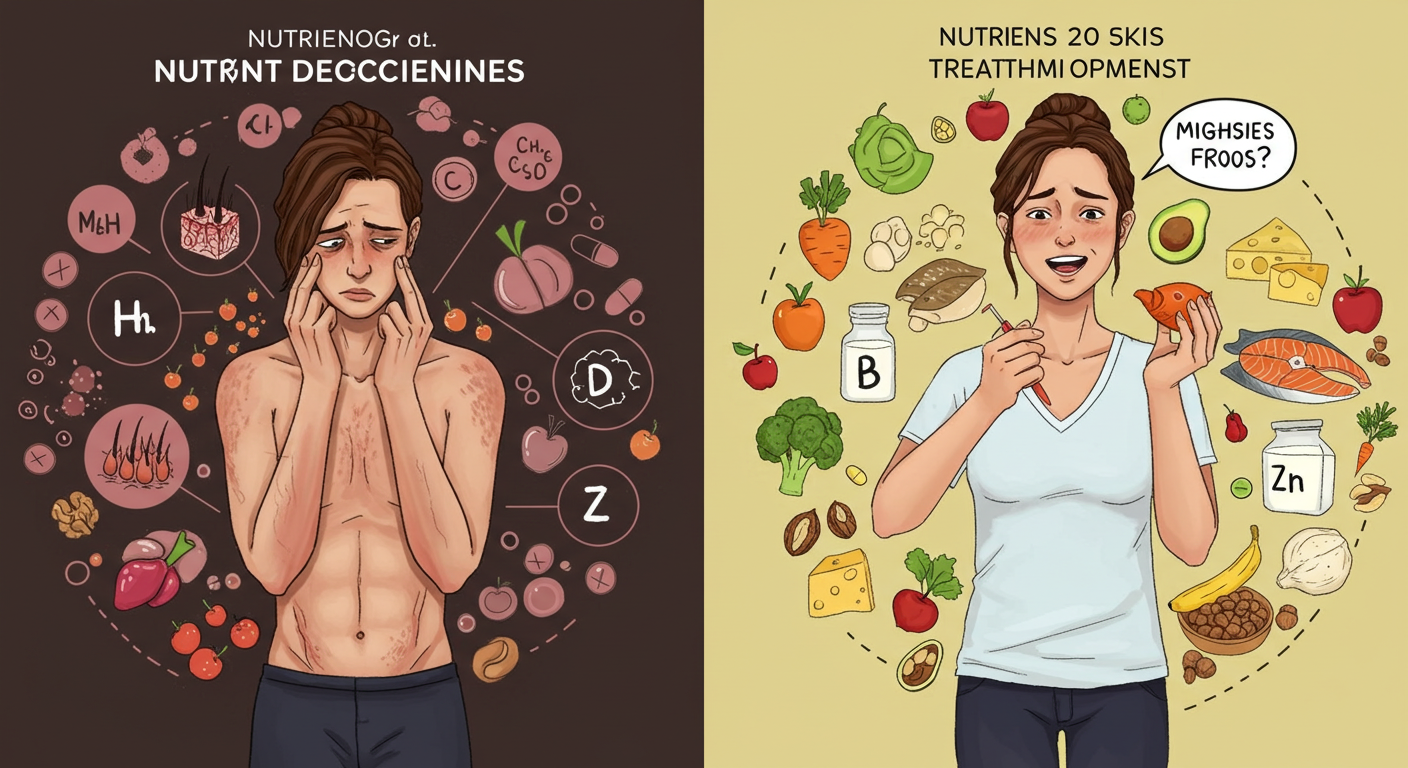
Your Body's Alarm Bells! Signs of Nutrient Deficiencies You Should Never Ignore
🥦 Nutrient Deficiencies: Symptoms, Causes, and How to Fix Them 🥑
Dr. Mina*

🥦 Nutrient Deficiencies: Symptoms, Causes, and How to Fix Them 🥑
🤔 Do you feel tired, have a weak immune system, or experience hair loss? These symptoms might be due to nutrient deficiencies! Many people suffer from a lack of essential vitamins and minerals without realizing it. In this article, you’ll learn about the symptoms of nutrient deficiencies, their causes, and the best ways to replenish them.
✅ This guide will help you assess your nutritional status and prevent problems associated with vitamin and mineral deficiencies.
🌟 Why Are Nutrients Essential for the Body?
The human body needs vitamins and minerals to:
✔️ Perform daily functions 🏃♂️
✔️ Repair tissues 🩹
✔️ Strengthen the immune system 🛡️
✔️ Maintain energy levels ⚡
Any deficiency in these essential nutrients can lead to serious health issues.
🚨 What Causes Nutrient Deficiencies?
🔸 Unbalanced diet (excessive processed food, lack of fruits and vegetables)
🔸 Stress and a hectic lifestyle 😫
🔸 Digestive disorders that hinder nutrient absorption
🔸 Certain medications that reduce vitamin absorption 💊
🔸 Chronic diseases, pregnancy, and breastfeeding 🤰
🔎 Symptoms of Nutrient Deficiencies
1️⃣ Magnesium Deficiency 🧲
Why is magnesium important?
Magnesium plays a role in over 300 biochemical reactions in the body and is essential for muscle, nerve, and heart health.
🛑 Symptoms of magnesium deficiency:
✔ Muscle cramps and spasms 💪
✔ Insomnia and irregular sleep 😴
✔ Anxiety and nervous irritability 😟
✔ Frequent headaches and migraines 🤕
✔ Irregular heartbeat ❤️
🥗 Best food sources of magnesium:
• Avocados 🥑
• Almonds and walnuts 🌰
• Spinach 🥬
• Bananas 🍌
• Broccoli 🥦
2️⃣ Iron Deficiency 🩸
Why is iron important?
Iron is essential for producing hemoglobin, which carries oxygen in the blood.
🛑 Symptoms of iron deficiency:
✔ Extreme fatigue and general weakness 😩
✔ Hair loss and brittle nails 🧑🦲
✔ Heart palpitations and dizziness 💓
✔ Pale skin and lips 🏳
🍖 Best food sources of iron:
• Red meat 🥩
• Eggs 🥚
• Spinach 🥬
• Lentils and legumes 🌱
📌 Tip: To improve iron absorption, consume it with vitamin C (like oranges 🍊).
3️⃣ Vitamin D Deficiency ☀️
Why is vitamin D important?
This vitamin is crucial for calcium absorption and bone health.
🛑 Symptoms of vitamin D deficiency:
✔ Bone pain and muscle weakness 🦴
✔ Weak immune system and frequent infections 🤧
✔ Depression and mood swings 😞
🐟 Best food sources of vitamin D:
• Salmon 🐠
• Egg yolks 🥚
• Fortified dairy products 🥛
• Sunlight exposure ☀️
4️⃣ Vitamin B Deficiency 🧠
Why are B vitamins important?
These vitamins are essential for energy production and brain health.
🛑 Symptoms of vitamin B deficiency:
✔ Fatigue and low energy 💤
✔ Poor concentration and memory loss 🤯
✔ Hair loss and brittle nails 😖
🍞 Best food sources of B vitamins:
• Meat 🍖
• Eggs 🥚
• Dairy products 🥛
• Whole grains 🌾
5️⃣ Vitamin C Deficiency 🍊
Why is vitamin C important?
Vitamin C is essential for skin health and a strong immune system.
🛑 Symptoms of vitamin C deficiency:
✔ Fatigue and general weakness 😴
✔ Bleeding gums and mouth inflammation 🩸
🍓 Best food sources of vitamin C:
• Oranges 🍊
• Lemons 🍋
• Bell peppers 🫑
• Strawberries 🍓
🩺 How to Test for Nutrient Deficiencies
To diagnose vitamin and mineral deficiencies, you can use the following tests:
✅ Blood tests: To check levels of iron, vitamin D, vitamin B12, and other nutrients 🩸
✅ Urine tests: To measure certain minerals like magnesium and zinc 🚽
✅ Specialized medical tests: To detect conditions that affect nutrient absorption 🏥
If you experience symptoms of vitamin deficiency, consult a doctor for necessary tests.
❓ Frequently Asked Questions (FAQ)
1️⃣ How can I tell if I have a vitamin deficiency?
If you experience persistent fatigue, a weak immune system, hair loss, and mood changes, you may have a vitamin deficiency. A blood test can confirm it.
2️⃣ Are vitamin supplements a substitute for a healthy diet?
❌ No, the best way to get vitamins is through natural food sources. Supplements should only be taken when necessary and with a doctor’s recommendation.
3️⃣ How long does it take to recover from a vitamin deficiency?
⏳ Depending on the severity of the deficiency, it may take several weeks to months for the body to return to normal levels.
4️⃣ Can taking too many vitamins be harmful?
⚠️ Yes, excessive intake of certain vitamins, such as vitamin A and D, can have side effects. Always maintain a balanced intake.
5️⃣ Are children and the elderly more at risk of nutrient deficiencies?
👶🧓 Yes, growing children and the elderly are more vulnerable due to metabolic changes and reduced appetite.
🎯 Conclusion
Nutrient deficiencies can significantly impact overall health. By recognizing deficiency symptoms and consuming the right foods, you can prevent many health issues. If you suspect a deficiency, it is advisable to get a blood test and consult a nutritionist.
📌 Did you find this article helpful?